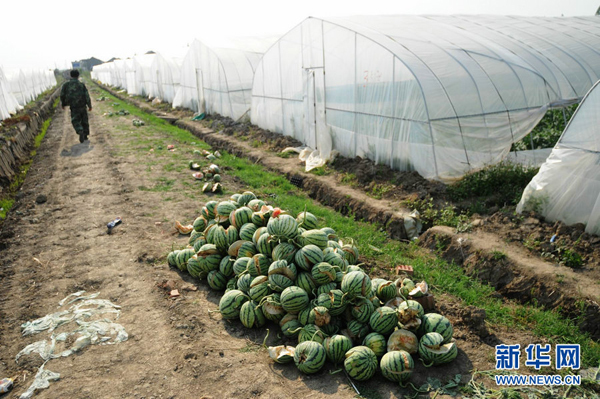Exploding watermelons caused by chemicals
An investigation into bursting watermelons in east China's Jiangsu Province shows that growth promoter as well as sudden rainfall may be to blame, said experts on Tuesday.
 |
|
Watermelons have been bursting by the score in eastern China?after farmers gave them overdoses of growth chemicals during wet weather. |
More than 700 mu (46.7 hectares) of watermelons have been ruined due to the problem in the city of Danyang in May, the harvest time for watermelons in southern China.
At the village of Dalu, within the jurisdiction of Danyang, 67 percent of Liu Mingsuo's watermelons have burst, with watermelon pieces piled up in the field.
"This is the first year that I have planted watermelons. I sprayed forchlorfenuron, a growth accelerator, and instant calcium on May 6. The next day, about 180 watermelons burst," said Liu Mingsuo.
There are now 20 watermelon producers in the village, up from only seven in 2010 since last year saw a bumper harvest.
Agriculture experts believe that the problem is caused by multiple factors such as the use of forchlorfenuron and sudden heavy rainfall after a long period of dry weather after checking 10 watermelons producers' land in the village.
Only one of the 10 producers, Liu Mingsuo, used forchlorfenuron. The timing was wrong, as he put it on too late in the season, said Wang Liangju, professor with Nanjing Agriculture University.
The instant calcium he applied could not be blamed as it prevents melons from bursting, said Wang.
However, farmers who did not use forchlorfenuron said they had also suffered from the same problem.
Wang said heavy rainfall had followed a dry-spell, and that was when most of the watermelons burst.
More watermelons had burst on the low-lying fields with rain water ponds, said Wang.
It is normal for about 10 percent of watermelons to burst, said Xu Jinhua, with the Jiangsu Academy of Agricultural Sciences. "The bursting rate often has something to do with the melon variety, weather, and so on," said Xu.
Forchlorfenuron is not forbidden in China and is allowed in the United States for use on kiwifruit and grapes.
Xinhua reporters called the manufacturer of the forchlorfenuron used in the village, and the company replied that their products have been sold for ten years without complaints.
But many consumers are still concerned about the safety of those "blown-up watermelons".
"I am worried that some of the good-looking fruits still have chemical residue and are not safe to eat," said Zhou Haiying, a resident in the city of Nanjing.
"Overly large fruits are common, such as strawberries as big as ping-pong balls and grapes as big as eggs," said Ma Dingkun, a resident in the city of Wuxi.
"The chemical is safe as long as the right amount is used. And there is sometime before the fruits hit the market and forchlorfenuron residue is often too little to detect, so it basically has no side effects on people," Wang said.
To address consumers' concern, Wang suggested that an agricultural produce tracking system should be established so that consumers can know what kind of pesticides and fertilizers have been used and what amount of each has been used.
The exploding watermelons are the latest case triggering consumer concern after a string of food safety issues, such as milk with nitrite and dirty, recycled cooking oil.
 0
0 






